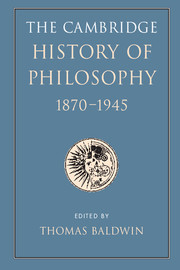Book contents
- Frontmatter
- Contents
- List of contributors
- Introduction
- I 1870–1914
- 1 Positivism, Idealism, and Pragmatism
- 2 Psychology and Philosophy
- 3 Logic, mathematics, and judgement
- 4 Philosophy and the new physics
- 5 The idea of social science
- 6 Ethics, politics, and legal theory
- 18 Utilitarians and idealists
- 19 Nietzsche
- 20 The new realism in ethics
- 21 Individualism vs. collectivism
- 22 Marxism and anarchism
- 23 Legal theory
- 7 Philosophy of religion and art
- Interlude
- II 1914–1945
- Biobibliographical appendix
- Bibliography
- INDEX
- References
20 - The new realism in ethics
from 6 - Ethics, politics, and legal theory
Published online by Cambridge University Press: 28 March 2008
- Frontmatter
- Contents
- List of contributors
- Introduction
- I 1870–1914
- 1 Positivism, Idealism, and Pragmatism
- 2 Psychology and Philosophy
- 3 Logic, mathematics, and judgement
- 4 Philosophy and the new physics
- 5 The idea of social science
- 6 Ethics, politics, and legal theory
- 18 Utilitarians and idealists
- 19 Nietzsche
- 20 The new realism in ethics
- 21 Individualism vs. collectivism
- 22 Marxism and anarchism
- 23 Legal theory
- 7 Philosophy of religion and art
- Interlude
- II 1914–1945
- Biobibliographical appendix
- Bibliography
- INDEX
- References
Summary
In the period from 1870 to 1914 there was a shift within moral philosophy towards meta-ethical concerns. Metaethics and its guiding idea that the first task in moral philosophy is an enquiry into the semantics of moral discourse and into its ontological foundations, though by no means an invention of twentieth-century philosophy, has become its most characteristic feature.
The history of twentieth-century ethics starts in Cambridge, where in 1903 G. E. Moore published Principia Ethica. It rarely happens, as it did with Principia Ethica, that one book accounts for so many of the later developments in a field. It was Moore’s declared intention to break sharply with the philosophical tradition. According to him, even the most prominent figures in the history of moral philosophy, for example, Aristotle, Kant, and Mill, have misunderstood the foundations of ethics. Too late to be of any influence on Principia Ethica, Moore thinks he has discovered a soul-mate. In the Preface to the first edition of Principia Ethica Moore writes: ‘When this book had been completed, I found, in Brentano’s Origins of the Knowledge of Right and Wrong opinions far more resembling my own, than those of any other ethical writer with whom I am acquainted’ (Moore 1903 [1993a: 36]).
- Type
- Chapter
- Information
- The Cambridge History of Philosophy 1870–1945 , pp. 277 - 288Publisher: Cambridge University PressPrint publication year: 2003



